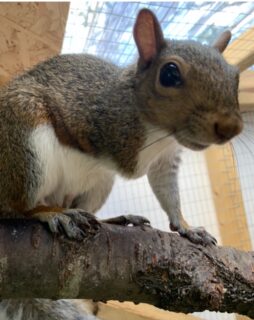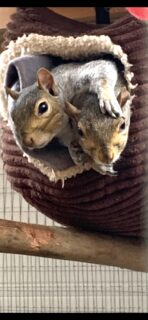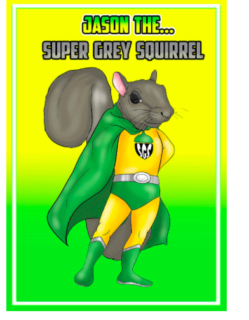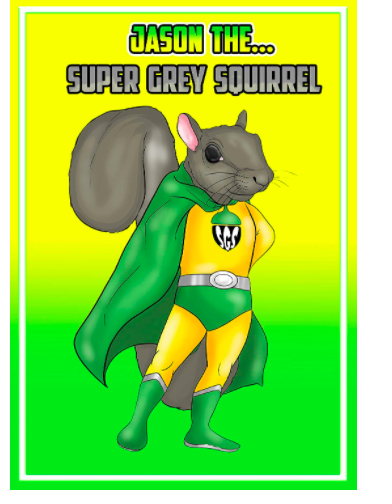In Writers Talking, our book reviewer Sallie Eden talks to Paul Allum about his delightfully illustrated book, ‘Jason the Super Grey Squirrel’ and the work he and his wife Ania do through their Squirrel Rescue.
 Whilst some of us see squirrels as a nuisance, particularly when they dig up our bulbs, others enjoy the presence of these entertaining creatures and have found simple and humane ways of protecting plants. I welcome several regular squirrel visitors to my garden, so I was intrigued when I came across Paul’s charming, children’s book about Jason, a disabled grey squirrel. But the book is not just about Jason, as Paul says “it’s also about the challenges people (and animals) with disabilities may face in their everyday lives. It aims to encourage children to help each other, to stand by their friends and, of course, I hope it will educate children (and adults) about grey squirrels.”
Whilst some of us see squirrels as a nuisance, particularly when they dig up our bulbs, others enjoy the presence of these entertaining creatures and have found simple and humane ways of protecting plants. I welcome several regular squirrel visitors to my garden, so I was intrigued when I came across Paul’s charming, children’s book about Jason, a disabled grey squirrel. But the book is not just about Jason, as Paul says “it’s also about the challenges people (and animals) with disabilities may face in their everyday lives. It aims to encourage children to help each other, to stand by their friends and, of course, I hope it will educate children (and adults) about grey squirrels.”
Paul’s day job is working for local Highways’ maintenance and his wife, Ania, works from home, enabling her to check on the squirrels during the day and, if necessary, stay awake to care for them at night. Writing about Jason, a real-life squirrel who may or may not be a ‘super squirrel’, was their first venture into writing and publishing a book.
I started by asking Paul how he first became involved with rescue work and he explained that “while out on an emergency call to a fallen tree, my son and I found two baby squirrels huddled in the branches. Not knowing what to do, we brought them home and, finding there was no dedicated rescue centre in the area, we decided to care for them. Although we have five cats and are used to caring for them, we didn’t have any real idea about how to look after squirrels, but Ania researched how to care for baby squirrels, feeding them every four hours, something she compares to raising babies of your own. That was that start of our rescue work. Those two squirrels, Ronnie and Reggie, appear in the book”.
 Whilst it is against the law to keep squirrels as pets, Paul and Ania’s garden has now been transformed into a rescue centre for Hertfordshire’s orphaned and injured squirrels. They say “it’s important for people to realise that they are wild animals, and they need to be free to live in their natural habitat, enjoying life in the trees and, yes, in our gardens. If someone finds an injured or orphaned squirrel, or any other wild animal, they should contact a local rescue centre or, if there isn’t one nearby or the centre can’t take on any more animals, they should seek help via organisations like www.helpwildlife.co.uk, which offers advice on when and how to help wildlife casualties. They also publish a directory of rescue organisations which can help”.
Whilst it is against the law to keep squirrels as pets, Paul and Ania’s garden has now been transformed into a rescue centre for Hertfordshire’s orphaned and injured squirrels. They say “it’s important for people to realise that they are wild animals, and they need to be free to live in their natural habitat, enjoying life in the trees and, yes, in our gardens. If someone finds an injured or orphaned squirrel, or any other wild animal, they should contact a local rescue centre or, if there isn’t one nearby or the centre can’t take on any more animals, they should seek help via organisations like www.helpwildlife.co.uk, which offers advice on when and how to help wildlife casualties. They also publish a directory of rescue organisations which can help”.
I wondered what prompted Paul and Ania to write the book. “Well, ever since we first had squirrels, we’ve had it in the back of our minds, but it was Jason’s arm being amputated that pushed us into actually writing it. Since publication we’ve had more ideas, including a colouring book and at least one other story. We admit we’re amateurs, this is all new to us, so we’d really appreciate input from people who can offer help or advice about writing, publication and publicity”.*
“Of course, we aren’t just using the book to educate, we also need to raise funds to support our work. We spend hundreds of pounds a month, feeding and caring for our squirrels, catering for their natural diet of fresh fruit and vegetables and making sure their vitamin and mineral requirements are met. We operate as a non-profit organisation, raising funds through our online shop and via our Facebook page. We also make use of an online wish list facility where people can purchase everything from blankets to peanuts and from vitamins to toys, all the things our furry residents need for a healthy, active life.”
“We take in injured or baby grey squirrels that have been found in the area and make sure they receive any necessary treatment. That involves feeding, housing and medical care. Baby squirrels, in particular, have special needs, for example, 24-hour care, including regular and frequent feeding to give them the best chance of survival.”
“Since December 2019, grey squirrels can no longer be released back into the wild. What this means is that any injured or orphaned squirrels which are found need to be looked after throughout their lives, and that is where we come in. As well as the cost of their food we have to cover the cost of building and maintaining their accommodation and meeting veterinary fees. The list goes on.”
 “We are currently caring for four grey squirrels: Ruben, who is missing a tooth, Ronnie, Reggie (now both grown up) and, of course, Jason, who arrived after a colleague’s cat brought him into their house, It was immediately clear that Jason had badly injured his arm, but thanks to our care and support from our wonderful vet, who features in the book, he lives his life to the full, together with his friends, in a safe and secure enclosure I built and which now takes over much of the garden.”
“We are currently caring for four grey squirrels: Ruben, who is missing a tooth, Ronnie, Reggie (now both grown up) and, of course, Jason, who arrived after a colleague’s cat brought him into their house, It was immediately clear that Jason had badly injured his arm, but thanks to our care and support from our wonderful vet, who features in the book, he lives his life to the full, together with his friends, in a safe and secure enclosure I built and which now takes over much of the garden.”
Jason has become something of a social media star, with people around the world following him online and even wanting to visit. Why is that? As Paul puts it “because greys matter”.
So how can people help? “We welcome donations through the website www.hitchinsquirrelrescue.co.uk which also has a link to the wish list and the shop. And, of course, we’d love it if people buy the book.”
*If you can offer advice on writing or publishing please contact Paul at hitchinsquirrelrescue@outlook.c

